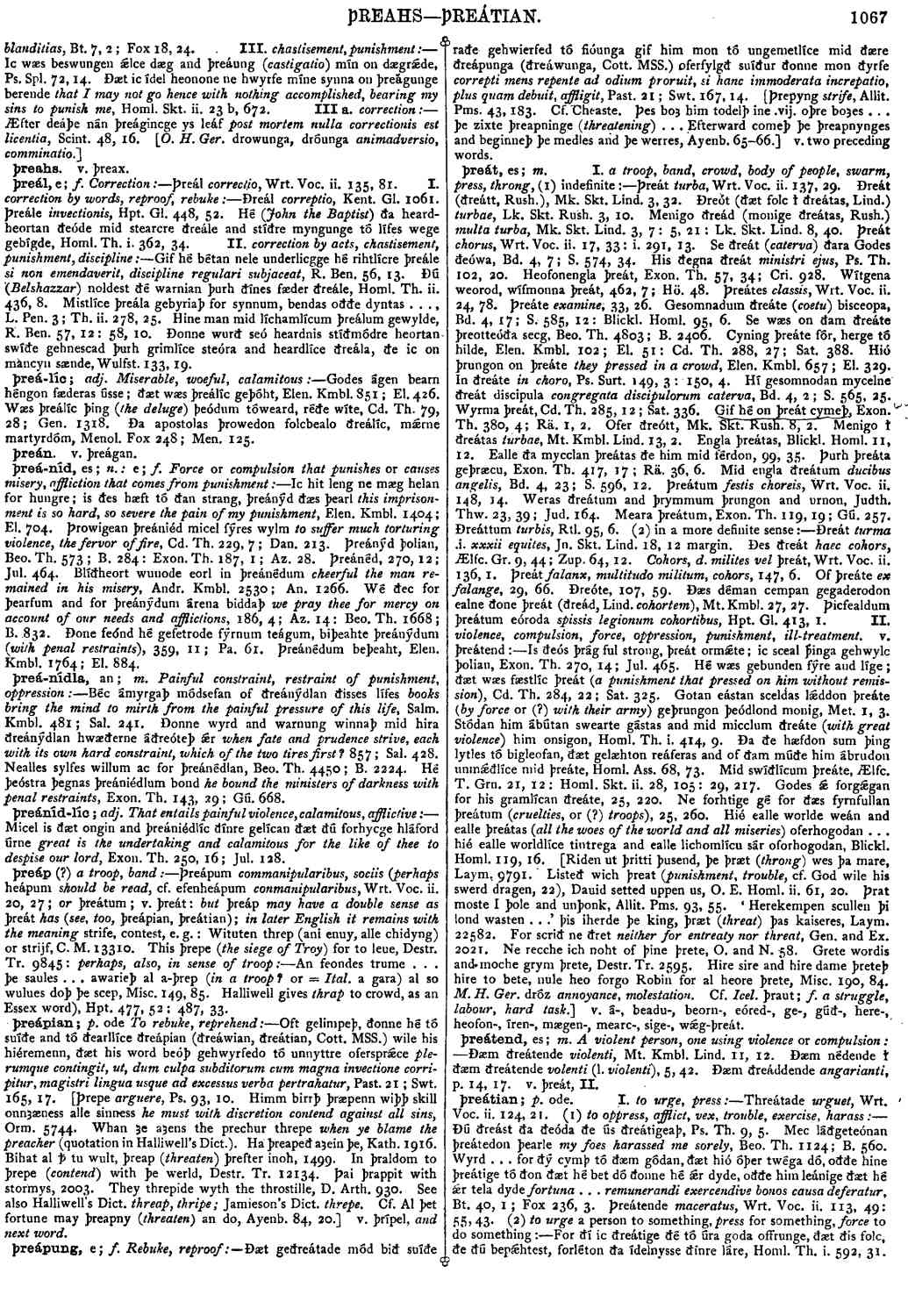þreát
- noun [ masculine ]
-
Þreát
turba,
- Wrt. Voc. ii. 137, 29.
-
Ðreát (ðreást, Rush.),
- Mk. Skt. Lind. 3, 32.
-
Ðreót (ðæt folc ł ðreátas, Lind.)
turbae,
- Lk. Skt. Rush. 3, 10.
-
Menigo ðreád (monige ðreátas, Rush.)
multa turba,
- Mk. Skt. Lind. 3, 7: 5, 21: Lk. Skt. Lind. 8, 40.
-
Þreát
chorus,
- Wrt. Voc. ii. 17, 33: i. 291, 13.
-
Se ðreát ( caterva ) ðara Godes ðeówa,
- Bd. 4, 7 ;
- S. 574, 34.
-
His ðegna ðreát
ministri ejus,
- Ps. Th. 102, 20.
-
Heofonengla þreát,
- Exon. Th. 57, 34 ;
- Cri. 928.
-
Wítgena weorod, wífmonna þreát,
- 462, 7 ;
- Hö. 48.
-
Þreátes
classis,
- Wrt. Voc. ii. 24, 78.
-
Þreáte
examine;
- 33, 26.
-
Gesomnadum ðreáte ( coetu ) bisceopa,
- Bd. 4, 17 ;
- S. 585, 12: Blickl. Homl. 95, 6.
-
Se was on ðam ðreáte þreotteóða secg,
- Beo. Th. 4803 ;
- B. 2406.
-
Cyning þreáte fór, herge tó hilde,
- Elen. Kmbl. 102 ;
- El. 51: Cd. Th. 288, 27 ;
- Sat. 388.
-
Hió þrungon on þreáte
they pressed in a crowd,
- Elen. Kmbl. 657 ;
- El. 329.
-
In ðreáte
in choro,
- Ps. Surt. 149, 3: 150, 4.
-
Hí gesomnodan mycelne ðreát discipula
congregata discipulorum caterva,
- Bd. 4, 2 ;
- S. 565, 25.
-
Wyrma þreát,
- Cd. Th. 285, 12 ;
- Sat. 336.
-
Gif hé on þreát cymeþ,
- Exon. Th. 380, 4 ;
- Rä. 1, 2.
-
Ofer ðreótt,
- Mk. Skt. Rush. 8, 2.
-
Menigo ł ðreátas
turbae,
- Mt. Kmbl. Lind. 13, 2.
-
Engla þreátas,
- Blickl. Homl. 11, 12.
-
Ealle ða mycclan þreátas ðe him mid férdon,
- 99, 35.
-
Þurh þreáta geþræcu,
- Exon. Th. 417, 17 ;
- Rä. 36, 6.
-
Mid engla ðreátum
ducibus angelis,
- Bd. 4, 23 ;
- S. 596, 12.
-
Þreátum
festis choreis,
- Wrt. Voc. ii. 148, 14.
-
Weras ðreátum and þrymmum þrungon and urnon,
- Judth. Thw. 23, 39 ;
- Jud. 164.
-
Meara þreátum,
- Exon. Th. 119, 19 ;
- Gú. 257.
-
Ðreáttum
turbis,
- Rtl. 95, 6.
-
Ðreát turma .i. xxxii equites,
- Jn. Skt. Lind. 18, 12 margin.
-
Ðes ðreát
haec cohors,
- Ælfc. Gr. 9, 44 ;
- Zup. 64, 12.
Cohors, d. milites vel
þreát,- Wrt. Voc. ii. 136, 1.
-
Þreát
falanx, multitudo militum, cohors,
- 147, 6.
-
Of þreáte
ex falange,
- 29, 66.
-
Ðreóte,
- 107, 59.
-
Ðæs déman cempan gegaderodon ealne ðone þreát (ðreád. Lind. cohortem ),
- Mt. Kmbl. 27, 27.
-
Þicfealdum þreátum eóroda
spissis legionum cohortibus,
- Hpt. Gl. 413, 1.
-
Is ðeós þrág ful strong, þreát ormǽte; ic sceal þinga gehwylc þolian,
- Exon. Th. 270, 14 ;
- Jul. 465.
-
Hé was gebunden fýre and líge; ðæt was fæstlíc þreát (
a punishment that pressed on him without remission
),- Cd. Th. 284, 22 ;
- Sat. 325.
-
Gotan eástan sceldas lǽddon þreáte (
by force or(?) with their army )
geþrungon þeódlond monig,- Met. 1, 3.
-
Stódan him ábútan swearte gástas and mid micclum ðreáte (
with great violence
) him onsigon,- Homl. Th. i. 454, 9.
-
Ða ðe hæfdon sum þing lytles tó bigleofan, ðæt gelæhton reáferas and of ðam múðe him ábrudon unmǽðlíce mid þreáte,
- Homl. Ass. 68, 73.
-
Mid swíðlícum þreáte,
- Ælfc. T. Grn. 21, 12: Homl. Skt. ii. 28, 105: 29, 217.
-
Godes ǽ forgǽgan for his gramlícan ðreáte,
- 25, 220.
-
Ne forhtige gé for ðæs fyrnfullan þreátum (
cruelties, or(?) troops ),
- 25, 260.
-
Hié ealle worlde weán and ealle þreátas ( all the woes of the world and all miseries ) oferhogodan ... hié ealle worldlíce tintrega and ealle lichomlícu sár oforhogodan,
- Blickl. Homl. 119, 16.
- Laym. 9791.
- O. E. Homl. ii. 61, 20.
- Allit. Pms. 93. 55.
- Laym. 22582.
- Gen. and Ex. 2021.
- O. and N. 58.
- Destr. Tr. 2595.
- Misc. 190, 84.
Bosworth, Joseph. “þreát.” In An Anglo-Saxon Dictionary Online, edited by Thomas Northcote Toller, Christ Sean, and Ondřej Tichy. Prague: Faculty of Arts, Charles University, 2014. https://bosworthtoller.com/32014.
Checked: 1